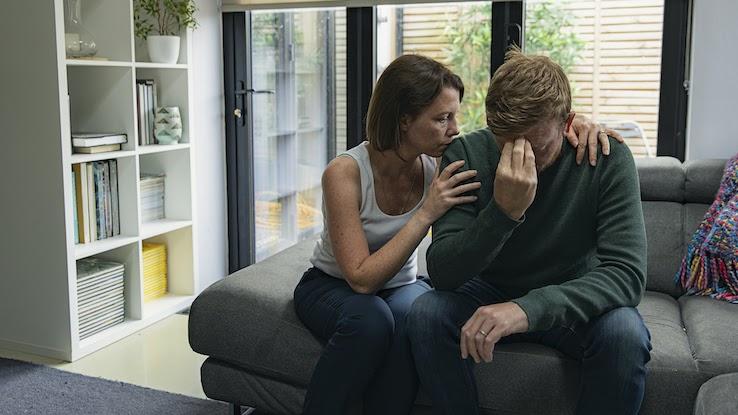
Editor’s Note: If you’re having thoughts about self-harm or are feeling suicidal, or if you’re concerned that someone you know may be in danger of hurting themselves, call the National Suicide Prevention Lifeline at 1-800-273-8255. Certified crisis-response professionals are available for help 24 hours a day, seven days a week, and can provide assistance if you or someone you know is experiencing mental health distress.
While there isn’t a standard clinical definition for a nervous breakdown or a precise psychiatric
diagnosis — technically speaking, a nervous or mental breakdown isn’t a clinical term — many health experts today refer to a nervous breakdown as a “mental health crisis.” By its generally accepted definition, a mental health crisis is an event in which a person has reached their mental limit and is unable to cope or function effectively in their day-to-day life. The event often occurs in response to stress or an external influence such as a divorce, unemployment or the death of a loved one.
The experience of a mental health crisis may suggest an underlying health condition, such as depression or anxiety, that requires medical treatment. However, these acute events are usually considered temporary episodes that signal the need for an individual to pause, relax, recuperate or even seek professional help.
If you believe you’re experiencing a mental health crisis, talk to your primary care doctor about your signs and symptoms, or seek help from a licensed mental health specialist.
Signs and Symptoms of a Crisis
Signs and symptoms of a mental health crisis vary from person to person and can manifest in different ways. Here are some common signs to pay attention to:

- Depressive symptoms: Serious clinical depression can trigger a mental health crisis. Loss of interest in things you once enjoyed is a potential clue that you’re experiencing depression, as are sudden, dramatic weight gain or weight loss or sleep changes. Thoughts of suicide, self-mutilation and loss of all hope are very serious indicators of a mental health crisis. If you’re experiencing any of these symptoms, seek professional help immediately.
- Anxiety: Extreme anxiety combined with a major stressor (such as a divorce) may precede a breakdown. Signs and symptoms of anxiety include increased blood pressure, clenched or tensed muscles, clammy hands, trembling or shaking, dizziness and an upset stomach.
- Extreme mood swings: Mood swings and unexplained outbursts can foretell a crisis. They may also indicate an underlying condition such as bipolar disorder (formerly known as manic depression).
- Hallucinations: Hallucinations may accompany a mental health crisis, especially in individuals who have schizophrenia or a history of substance misuse. People with hallucinations may, in some situations, pose a risk to themselves or others.
- Panic attacks: Panic attacks are often associated with anxiety and depression. Symptoms of a panic attack may include increased blood pressure, pounding chest pain, difficulty breathing, feelings of unreality, an extreme level of fear and detachment from one’s self. They may cause a person to feel fear of being in crowds or enclosed places (known as agoraphobia).
- Paranoia: As with phobias and fear, paranoia can signal a decline in mental health. People who fear that someone is watching or following them may demonstrate a significantly reduced ability to cope. Get help from the authorities if you think you’re being stalked, but seek professional medical help if there are indications that your fears are unfounded, or not based in reality.
- Social withdrawal: People facing a mental health crisis may isolate themselves from others, especially friends and family. Social settings can cause stress, so someone at risk of a mental health crisis may choose alienation over social interaction. Sometimes a person simply needs time alone to recuperate from a stressful situation, however persistent isolating behavior may indicate a more serious concern.
- Flashbacks of a traumatic event: Traumatic events in a person’s past may trigger symptoms of a mental health crisis in the present. They can also indicate an underlying case of post-traumatic stress disorder (PTSD), which a healthcare professional can diagnose.
When and How to Take Action in Managing a Mental Health Crisis
Most people are familiar with the feeling of being overwhelmed or temporarily unable to cope, though recurring episodes could mean you have an underlying condition that could benefit from proper treatment. If you or someone you know is experiencing intense levels of any of the symptoms listed above, seek professional care from a psychiatrist, psychologist or another licensed mental health professional.

If an individual is in imminent danger either to themselves or others, contact 911 immediately. You can also seek out a local or national crisis center or hotline for immediate assistance.
Over time, you may start to recognize the triggering events that precede your distress. Although it may not be possible to avoid these events completely, there are steps you can take to help manage your symptoms and reduce the chances that you experience them repeatedly:
Speak to a licensed mental health professional and consider a form of regular therapy, such as cognitive behavioral therapy.
Avoid caffeine, alcohol and recreational drugs.
Ensure you get adequate sleep each night.
Exercise regularly to provide a natural outlet for stress.
Try meditation or practicing mindfulness.
If you feel that you’ve exhausted all options for managing your stress or are still experiencing symptoms, speak to your healthcare provider. They can help you navigate your feelings and provide you with a diagnosis if your breakdowns are a symptom of a mental health disorder.
How and Where to Find Help
If you’re a caregiver for someone with mental health issues or you’re concerned about the mental health of someone close to you, keep in mind that it may be difficult for your loved one to seek help on their own. You can make that process easier by offering encouragement and acknowledgement that what they’re going through isn’t easy.

As a friend or family member, you might learn to recognize the signs of your loved one’s mental health deterioration before they’re experiencing an immediate crisis, and your support can be a helpful preventive tool. If the person experiencing these symptoms has enough caring support from others, it can make a significant difference in helping them regain control of their life.
Need help looking for a therapist? Start by searching online. Many sites allow you to search by specialty and ZIP code. Other sites offer guidance regarding what your insurance will cover. The Anxiety and Depression Association of America offers a directory you can use to find a therapist using search parameters like location, disorders treated and therapy type (in-office, video conferencing, home visitations, etc.).
In addition to seeking professional help, visit the Anxiety and Depression Association of America’s website to find more resources and information. If you or someone you know is experiencing a mental health crisis or you’d like assistance finding treatment referrals and other information, contact the Substance Abuse and Mental Health Services Administration National Helpline at 800-662-4357.
Resource Links:
https://pubmed.ncbi.nlm.nih.gov/9857496/
https://www.nimh.nih.gov/health/find-help/index.shtml
https://www.nami.org/About-Mental-Illness/Warning-Signs-and-Symptoms





